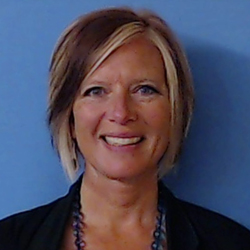In the Spotlight
Katherine Graham, RN BN
Director of Access and Transition, Concordia Hospital
 How did you personally process and analyze the changes that were announced for Concordia as part of the Healing our Health System plan?
How did you personally process and analyze the changes that were announced for Concordia as part of the Healing our Health System plan?
Maybe it's because I have had a lot of experience with change, both in my personal and professional life, but I have always managed to remain open and positive. I look at those "pivot points" as opportunities to reflect, analyze, evaluate and, then, focus my attention and energy towards that new direction. Now, this is not to say that the need for change has always been easy or obvious. Sometimes, the greatest and most important change is painful and difficult and you may or may not have seen it coming. Both are ultimately necessary but the latter builds a better, stronger foundation because it takes resolve, focus and dedication to see it through. Maybe even some faith to believe that, in the end, this will be a better direction.
How do you help nurses process those same changes and maintain their focus on care as the landscape for Concordia develops?
In specific reference to the recent changes to our health care system, after returning to Canada in 2009 after working 16 years in various health care areas and institutions throughout the United States, I had actually hoped this day would come. While the current system was fraught with road blocks and process challenges, I learned to navigate and make this system work for me as I facilitated care for patients as a Clinical Manager at Concordia Hospital. However, in mid-2015, I began to get the sense that the region was on the verge of deciding to make some radical changes. When the actual announcement was made, it was an unsettling message yet a direction that was imperative in order for our health care system to be sustainable in Manitoba. I was excited and wanted to be a part of that effort to make the necessary changes.
You've taken a very positive, proactive approach to change management at your site. Is that part of Concordia's culture, or have you cultivated that perspective?
Much of the work at Concordia has been to support staff through these changes. I can't blame them for feeling stress . . . this is scary because many of them don't have any other point of reference. The way we work now is all many of the staff have ever known. I do a lot of listening and allow them the opportunity to air their concerns but I am well known for challenging beliefs and processes often asking, "Why not?" or "What for?" I feel that empowers teams and/or individual staff members to think outside the box and get really creative in a safe and open environment. None of what is being proposed is new. These health care concepts, delivery systems, public responsibilities and staffing models have been proven across many provinces and countries. What is most difficult for nurses is to seriously evaluate HOW they do their work and may even require them to challenge WHAT they do on a daily basis which can be extremely stressful for some. I do think we have created a lot of extraneous tasks and duties that have taken nurses away from their most valuable efforts and that is to provide hands-on patient care.
I am also the ever optimist with a good balance of realism. That is paramount . . . nurses need to stay positive, be creative, take this time as an opportunity to develop and grow the profession and lead co-workers and the public through this change. That will strengthen the confidence of the public perspective more than anything . . . because nurses are a very trusted profession.
What keeps you up at night while all this is going on?
There are some nights when I don't sleep but I pray for strength to keep going, the energy to keep me grounded, to focus on what matters and to pay attention to the signs and details which may be subtle. I try to touch base with as many people as I can during my day, even if it is to smile and say, "Hello, how are you doing" and MEAN IT.
The culture at Concordia Hospital is strong. We have a lot of very dedicated teams and disciplines that are engaged and working hard to see this change through and to ensure Concordia remains an important contributor to our health care system. We have worked to remove barriers and silos even within our walls which have created a positive synergy among our employees that then creates a better experience for our community that we serve.
Tips for creating a positive culture:
Smile, walk down the hall with your head up, say "hello", know each other by name, value what each member brings to the table, challenge mainstream thought(s), avoid negativity, don't dismiss an idea because of fear, be okay with being vulnerable, be open and honest, take every chance to communicate, and don't make a promise you can't keep. And, the most important, TRUST EACH OTHER. Trust needs to weave its way through units, departments, programs, sites and the region. We need trust and belief in one another for us to be successful in this endeavor. We have a long way to go on this journey, but I believe in the cause and know we have the right people in place to lead us through this change.
